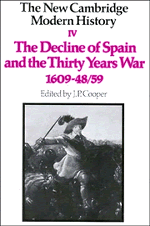Book contents
- Frontmatter
- INTRODUCTORY
- Chapter I General introduction
- Chapter II The European economy 1609–50
- Chapter III The exponents and critics of absolutism
- Chapter IV The scientific movement and its influence 1610–50
- Chapter V Changes in religious thought
- Chapter VI Military forces and warfare 1610–48
- Chapter VII Sea-power
- Chapter VIII Drama and society
- THE CENTRAL CONFLICTS
- THE UNMAKING AND REMAKING OF STATES
- THE FRONTIERS OF EUROPE
- References
Chapter IV - The scientific movement and its influence 1610–50
from INTRODUCTORY
Published online by Cambridge University Press: 28 March 2008
- Frontmatter
- INTRODUCTORY
- Chapter I General introduction
- Chapter II The European economy 1609–50
- Chapter III The exponents and critics of absolutism
- Chapter IV The scientific movement and its influence 1610–50
- Chapter V Changes in religious thought
- Chapter VI Military forces and warfare 1610–48
- Chapter VII Sea-power
- Chapter VIII Drama and society
- THE CENTRAL CONFLICTS
- THE UNMAKING AND REMAKING OF STATES
- THE FRONTIERS OF EUROPE
- References
Summary
Nearly all Galileo Galilei's (1564-1642) intellectual contemporaries would have agreed with his dramatic declaration that in order to introduce a new philosophy ‘it will be first necessary to new-mold the brains of men, and make them apt to distinguish truth from falsehood’. They called for a revolution in thinking about nature that would still be far in advance of results at the mid-century, but no previous generation had had so much reason to believe that it had at last acquired a method which, by correcting its own errors, offered the certainty of discovering the one actual structure of the physical world. Older habits of erudition and speculation in natural philosophy were losing their appeal and were being replaced by the practice of systematic research. The promise and achievements of the enterprise gave fresh confidence to appeals for conditions making such research possible, for more adequate provision for natural science in the universities and in new institutions, and for money to be spent on science in the public interest.
To a large extent the new science was establishing itself on the margins of official learning and recognized professional activities. This is reflected in the diversity of the occupations and social origins of the men engaged in science and the conditions in which they carried out their scientific work. Central to the traditional profession of learning were those holding academic posts in the faculties of arts or of medicine in universities or in newer institutions such as the Collège de France in Paris and Gresham College in London. If we include the minor figures this remained the largest single group. Yet the list of scientists who had no full-time academic post is equally impressive.
- Type
- Chapter
- Information
- The New Cambridge Modern History , pp. 132 - 168Publisher: Cambridge University PressPrint publication year: 1970
References
- 3
- Cited by

